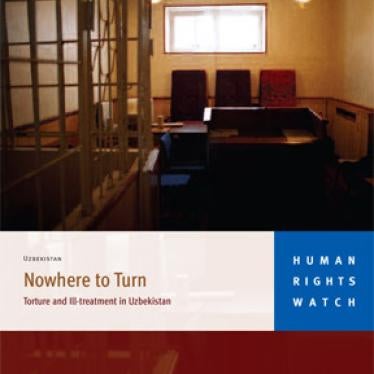The Uzbek presidential election on December 23 cannot be free or fair, said Human Rights Watch today.
Uzbekistan's longstanding and well-documented record of restricting opposition political activity and independent media prevents any semblance of a competitive electoral process.
“None of the conditions exist for free and fair elections,” said Holly Cartner, Europe and Central Asia director of Human Rights Watch. “While there are four candidates, it would be absurd to speak of a competitive process. There is no real choice.”
The Central Election Commission has approved four candidates – including President Islam Karimov – to run in the election. However, an interim report by the Office of Democratic Institutions and Human Rights’s Election Observation Mission, which is part of the Organization for Security and Cooperation in Europe (OSCE), covering the period December 5 - 15, stated that “all candidates publicly support the policies of President Karimov. There are no debates between candidates and no campaign materials of a competitive nature, which has been explained by Uzbek traditions not favoring confrontational election campaigns.”
Opposition political parties cannot operate freely in Uzbekistan, and there has not been a single election there that the OSCE has found to be free or fair. Opposition parties and movements such as Birlik (Unity), Erk (Liberty), Ozod Dekhkon (Free Peasant Party) and the Sunshine Coalition are denied registration or prevented from holding meetings. In March 2006, Sanjar Umarov and Nodira Khidoiatova, who are Sunshine Coalition leaders, were sentenced to 14 and 10 years in prison, respectively, on a variety of politically motivated charges. Umarov’s sentence was later reduced to seven years, while Khidoiatova was conditionally released. Umarov’s lawyer, Vitaly Krasilovsky, fled the country after articles in the state-controlled media accused him of supporting terrorists.
The government severely restricts free expression and persecutes independent journalists whose work is critical of the authorities. Many websites providing critical information on Uzbekistan are blocked by the authorities and are not accessible to people in the country, including www.ferghana.ru, www.muslimuzbekistan.org, the Human Rights Watch website, www.hrw.org, and others. However, the Uzbek state-run media does provide airtime to foreigners who praise the conduct of the elections and the state of democracy in Uzbekistan.







